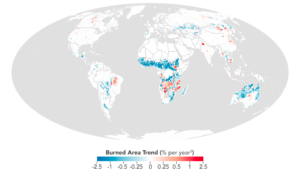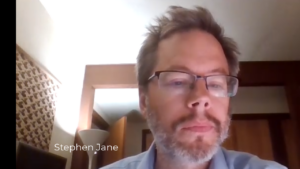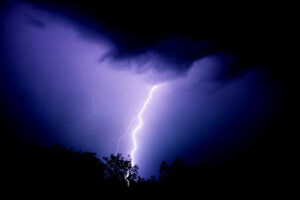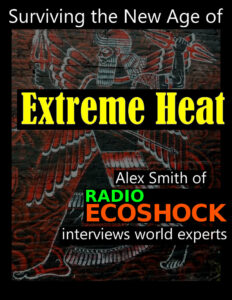Global heat roundup + Harvard’s Dr. Loretta Mickley: how fiery this planet is. Do wildfires and those far-flung clouds of smoke heat or cool the planet? The lakes are heating up, like everything else, and that means losing oxygen. From New York State, Stephen Jane explains new science on changing life in the lakes.
Listen to or download this Radio Ecoshock show in CD Quality (57 MB) or Lo-Fi (14 MB)
we need to sweat a bit
People in the Middle Ages feared the “sweating disease”. It killed fast: “laugh in the morning; dead by night” they said. It killed kings and peasants alike. Now comes the new sweating disease. Our home planet is warming rapidly. Heatwaves are signposts of global warming. They get hotter, come more often, sometimes back-to-back, later in the fall than ever, earlier in the spring. In the West, we had false summer in late May That whole block of 100 degree plus heat, almost 38 degrees C, rode through the Prairies setting records, roasting the East Coast for days, in early June.
At the same time, the Middle East experienced a record even for those hot lands. In several countries, temperatures went over 125 degrees F., 51 degrees C. It was by far a record for early June. Some called it the harshest spring heat event ever seen. Within a generation, that may be the new normal.
Axios climate and energy reporter Andrew Freedman published this at Yahoo:
“At the same time, an unusually severe early season heat wave has enveloped the Middle East and South Asia, prompting temperatures to spike above the 50°C (122°F) mark in at least five countries: Oman, the United Arab Emirates, Kuwait, Iran and Pakistan.
Typically, the hottest time of year in the Persian Gulf region as well as Pakistan comes in July.
The UAE tied its national all-time heat record on June 6 when the temperature in Sweihan, located about 70 miles outside Abu Dhabi, reached a sizzling 51.8 °C (125.2°F). This beat the previous record for the month of June, as well, according to Meteo-France meteorologist Etienne Kapikian.
Weather historian Maximiliano Herrera described the heat in the Middle East as well as Central Asia (temperatures set records in Tajikistan, Turkmenistan and Uzbekistan, as well) as the “[h]arshest heat wave in history for this time of the year.”
I have much more news on the growing climate heat emergency following our guests.
===================================================================================
DR. LORETTA MICKLEY – – SMOKY EARTH
We had terrible wildfires in so many places in recent years: California, the whole West, Australia, Canada, Siberia. So it is a shock when new science finds Earth was a smoky place even before the Industrial Revolution. That could mean our planet may not warm to the worst extremes shown in the latest climate models.
We are fortunate to have reached a senior scientist at Harvard with expertise on wildfire smoke and climate change. Dr. Loretta J. Mickley is Senior Research Fellow at the School of Engineering and Applied Sciences. Loretta is Senior Author in the new paper “Improved estimates of preindustrial biomass burning, reduce the magnitude of aerosol climate forcing in the Southern Hemisphere”. That was published May 28, 2021 in the journal Science Advances. The lead author is her recent grad student Pengfei Liu.

Listen to or download this 26 minute interview with Loretta Mickley in CD Quality or Lo-Fi
CLOUDS AND ALBEDO
Let’s talk about “black carbon”. What is it, and how can it affect climate change?
As the Arctic sea ice shrinks, most of us heard about the change in albedo, the amount of sunlight reflected back into space. If the albedo drops, Earth absorbs more heat and gets hotter. Please talk to us about this other albedo factor, happening at the top of the atmosphere (TOA) with black carbon. How does that work, and is that as important as ice and snow cover down below? Dr. Mickley explains that and a lot more in our interview.
DECREASING BURN
In 2017, a team led by Niel Andela at Cardiff University published their paper “A human-driven decline in global burned area”. They used NASA satellite data to show that, unexpectedly, global area burned declined by almost 25% over the past 18 years, despite the influence of global warming. How is that possible?

If burning of grasslands by African farmers has reduced the AREA burned each year, does it matter if more forests burn? Surely an acre or hectare of large scale forest burning releases much more carbon than a similar area of grasslands? Now we get into a great confusion for most of us. Suppose a giant forest burns, in the Amazon or the sub-Arctic Boreal. All the carbon in their trunks and branches goes into the atmosphere. That carbon should be a driver of even more global warming, but scientists also talk about wildfire smoke in terms of cooling. What is going on here?
Anyone who has lived in a smoke cloud for a week or two, as I have, knows a bank of smoke can turn hot weather cold and dark. The intense shade immediately cuts off solar heat. Does the long-term warming impacts of fires outweigh regional cooling from smoke? We discuss that. Note that Loretta carefully says that in a healthy ecosystem, the actual carbon released by burning forests does not add to the long-term burden of carbon dioxide in the atmosphere. That is because we assume the forest will grow back again, capturing a similar amount of carbon back out of the atmosphere to build roots, trunk, and branches.
But as we know, the ecosystem is increasingly not “healthy” and out of balance. Some trees burned for land clearing in the Amazon, in the most dense species-rich environment in the world, will never return. Humans converted that land into soy bean plantations of grasslands for cattle. Some scientists calculate the Amazon is now a net source for more carbon to the atmosphere, instead of a sink to store excess human-made carbon. The same is becoming true of the vast Boreal forests across the north. Logging, and road-building for oil and gas extraction plus mining are eating into the Boreal forests in Canada, Alaska, and Russia. But the extreme change in heat in the far north is another big factor that could change the forests and forest fires profoundly. If the peat below burns, that is new fossil carbon into the atmosphere and it could come at a giant scale. Could massive fires in northern peatlands emit more than humans in coming years?
Some tree replanting in the North American west is not regrowing as before. Drought is killing the seedlings, and no second attempt is made. Some parts of the West return to grasslands. It’s a complicated subject but I am not optimistic we are still in an ecological system healthy enough to say carbon from forest fires is decreasing or climate neutral. Either way, any loss of fire particulates is being more than compensated by clouds of particles pouring out as we burn fossil fuels 24 hours a day, every day, everywhere.
DEADLY FOSSIL FUEL SMOKE
In February this year, Loretta Mickley also co-authored a paper titled “Global mortality from outdoor fine particle pollution generated by fossil fuel combustion”. Just how deadly are those tiny particles coming out of our tailpipes and smokestacks as we burn fossil fuels?
That paper in Environmental Research was led by Karn Vohra from the University of Birmingham. Another co-author is one of my personal Gods in this subject: Dr. Joel D. Schwartz of Harvard. I interviewed him in 2008 on “How Smog Kills”. You can listen to my fact-filled rant against smog and the Dr. Schwartz interview here.
In February the “Global Mortality” paper with Mickley as co-author found: in the year 2012 smog killed three times more people than the official death toll so far in the COVID-19 pandemic. Why don’t we see the same strong reaction to clear up the air and save millions of lives?
SO HERE IS THE SURPRISING THING
Perhaps due to increased media coverage, and satellite photos, we all presume there are MORE wildfires in the last two hundred years, due to human activity. But in the Southern Hemisphere this turns out not to be true In fact, even with burning large amounts of fossil fuels, which emit black carbon like wildfires, the Black Carbon measured in Antarctica seem about the same.
This could only be the case if wildfires in the last 200 years have actually DECREASED, despite our impressions. When humans fragment the land (clearing for fields) we reduce large-scale wildfire spread. We also try to limit or put out some wildfires. Because of health concerns, there has also been a push by southern governments and international bodies to reduce clearing by fire, whether in the Amazon or by African farmers. For example, have fire emissions in Australia actually dropped, despite the recent horrible wildfires, because the Aboriginal people burned even more? I still have a lot of questions.
===================================================================================
“World’s lakes losing oxygen rapidly as planet warms”
STEPHEN JANE
We know dead zones are increasing in the ocean as the world warms. What about our lakes? New science finds lakes are also losing oxygen, reducing habitat for fish. But it isn’t easy to figure out how over a million world lakes will respond to climate change. One Canadian scientist estimates about 1.4 million lakes on Earth. They cover about 3% of Earth’s surface.
Even as he worked toward his PhD at Rensselaer Polytechnic, Stephen F. Jane was publishing his results, studying lakes in the United States. The latest work goes global and the news is not good.

PAPER: “Widespread deoxygenation of temperate lakes” Stephen F. Jane et al with Dr. Kevin Rose as co-author. Published June 2, 2021 in Nature.
“Our results suggest that climate change and declining water clarity have altered the physical and chemical environment of lakes. Declines in dissolved oxygen in freshwater are 2.75 to 9.3 times greater than observed in the world’s oceans and could threaten essential lake ecosystem services.”
DEEP WATER
This paper reports serious loss of deep lake water habitat for fish. But deep-water temperatures have been stable (since measurements began in 1941), so other factors than simple heat are at work. For deep water, oxygen loss comes as the difference between the warmer surface and deep water. That difference discourages mixing, resulting in layers called “stratification”.
So global warming causes heating of lakes surface waters, which cuts oxygen exchange with deeper water due to stratification. That is the key finding that could endanger deep water living things, which have adapted their efficiency for the long-time stable level of oxygen normally expected. Some species can move upward, others may disappear.
The authors say:
“We find deep-water lake habitats are especially threatened, and deep-water DO trends may portend future losses of cold-water and oxygen-sensitive species, increased internal nutrient loading which exacerbates eutrophication and the formation of harmful algal blooms, and potentially increased storage and subsequent outgassing of methane.”
This new science brings out a deeper trend which should worry every fisherman and woman. You may picture North Americans or Europeans, but people on all continents depend on lake fisheries for livelihoods and basic protein to survive. There is a lot to lose here.
OTHER RESOURCES
Article in the UK Guardian newspaper.
In this interview I also mention…
EXTREME LAKES WITHOUT ENOUGH OXYGEN FOR LIFE
Author and Professor Peter Ward wrote (in his 2007 book “Under A Green Sky”) about diving in 2 lakes in Asia that were so low in oxygen they had switched to life forms using the sulfur cycle. The water was kind of purple, looking lifeless, and emitted “swamp gas” hydrogen sulfide. We don’t want to go there.
===================================================================================
HOTTER, FASTER, THAN THEY TOLD US
NOAA, the U.S. National Oceanic and Atmospheric Administration, just announced even the pandemic shutdowns did not stop increases in dangerous greenhouse gas emissions. We are approaching 420 parts per million Carbon Dioxide in the atmosphere.
A few years into producing Radio Ecoshock, in 2013 CO2 in the atmosphere crossed 400 parts per million. Scientists and anyone awake to climate risk were on a scale from worried to frightened. Adding methane and other potent greenhouse gases, it felt like a tipping point, where a wrenching shift was inevitable. This week, the new safety barrier broken at 420 ppm is barely news.
We have created a vast system of distractions taking us away from the new invasion by heat, ocean flooding coastal areas, and a long list of challenges including a mass extinction of other species. Our favorite places, our safe places will morph away, likely toward less life, for a long, long time.
The world is likely to hit 1.5 degrees C warming by the year 2025.
For a few years on this show, I complained about the unreality of discussing holding global warming at 1.5 degrees C. by the year 2100. That was maybe a valid hope in 1990. Not after 2010. Finally, at least one global institution is ready to acknowledge that ship has sailed. The World Meteorological Organization updated it’s data. They now say the world is likely to hit 1.5 degrees C warming by the year 2025. Not by the end of the century. Coming right up.
In the next few years, even the cool years will be hotter than anything you grew up with, says the WMO. By 2025, we should also expect another record hot year to beat the current record holder, 2016. So this is it. Global warming is here. The climate is changing. We may be able to affect how much, how fast.
CLIMATE DOMINOES FALLING
OPEN ACCESS. Published June 3, 2021 in Earth System Dynamics.
“Interacting tipping elements increase risk of climate domino effects under global warming”.

The five authors come from Potsdam Institute for Climate Impact Research (PIK), and University of Potsdam. In this show, I read the Abstract from that paper, without the complex paragraph on methods. If you have not heard it, you should read this now, from this hugely important new paper led by NIco Wunderling:
ABSTRACT
“With progressing global warming, there is an increased risk that one or several tipping elements in the climate system might cross a critical threshold, resulting in severe consequences for the global climate, ecosystems and human societies. While the underlying processes are fairly well-understood, it is unclear how their interactions might impact the overall stability of the Earth’s climate system.
As of yet, this cannot be fully analysed with state-of-the-art Earth system models due to computational constraints as well as some missing and uncertain process representations of certain tipping elements. Here, we explicitly study the effects of known physical interactions among the Greenland and West Antarctic ice sheets, the Atlantic Meridional Overturning Circulation (AMOC) and the Amazon rainforest using a conceptual network approach.
We analyse the risk of domino effects being triggered by each of the individual tipping elements under global warming in equilibrium experiments……Overall, we find that the interactions tend to destabilise the network of tipping elements.
Furthermore, our analysis reveals the qualitative role of each of the four tipping elements within the network, showing that the polar ice sheets on Greenland and West Antarctica are oftentimes the initiators of tipping cascades, while the AMOC acts as a mediator transmitting cascades. This indicates that the ice sheets, which are already at risk of transgressing their temperature thresholds within the Paris range of 1.5 to 2 deg C, are of particular importance for the stability of the climate system as a whole.”
Damian Carrington, Environmental Editor at the Guardian, filed his story on this breaking science with this: “Climate tipping points could topple like dominoes, warn scientists
Analysis shows significant risk of cascading events even at 2C of heating, with severe long-term effects“.
Remember from our previous guests, a tipping point is not the destination, but the point where a significant change is inevitable and unfolding. In the example of Greenland ice cover, the tipping point would be when almost total deglaciation of Greenland is unstoppable. Greenland has been ice-free at least once before in the last million years. The Thwaites Glacier melt in Antarctica is now unstoppable, according to NASA.
But does Greenland reach that tipping point before, after, or because of changes in the Atlantic Meridional Overturning Circulation (AMOC), which includes the Gulf Stream? This new science investigates those interactions and concludes, quote:
“the polar ice sheets on Greenland and West Antarctica are oftentimes the initiators of tipping cascades, while the AMOC acts as a mediator transmitting cascades.”
Where would the cascade be transmitted? As far as the Amazon? If a cascade of tipping points develops, even during this decade, how would these large changes affect Indonesia or Mongolia? Everything in the Earth system is connected.
I previously covered this issue in my show “Disaster in the Making: Cascading Tipping Points & Permafrost”. That was posted on January 8, 2020. Our guest Professor Tim Lenton from the University of Exeter was lead author of a Comment in the journal Nature called “Climate tipping points — too risky to bet against”. One of their major worries was cascading tipping points. Now this new study from the respected Potsdam Institute scientists shows this global disaster, unfolding over decades, could happen – even if the goals of the Paris Climate accord were met.
We are all standing in a busy freeway. Large forces zip by us. Humanity will likely be hit by a truck if we don’t get off the road.
Get off the road.
Disaster in the Making: Cascading Tipping Points & Permafrost
MORE AND MORE EXTREME HEAT NEWS!
UK heatwave forecast: Charts turn red as 28C scorcher to hit in DAYS – new long-range maps
BRITONS are set to be scorched by searing heat as long-range forecasts predict a sweltering heatwave.
Then Johanna Wagstaff CBC June 6 2021.
Super hot in Pakistan
June 9, 2021. Hot Weather In Islamabad 20 School Kids Fainted, Schools closed in Lahore, Pakistan due to the heat.
June 9 Pakistan. Due to hot weather and frequent Power cuts People throng to Ranveer River.
“A PLANET THAT’S BETTER OFF FOR WHAT WE DID”
Prime Minister Ardern says action on climate change question of ‘life or death’. 8 Jun, 2021 Literally a breath of fresh air on the world stage is PM Ardern from New Zealand. In this show I play an excerpt from her speech, which should come from the mouths of all politicians on the planet, as we enter this extreme climate crisis.
Some time in the next few years, most people will know.
I don’t know if this will be the summer when extreme heat reaches billions of minds, powering a global response. Nobody does. Some time in the next few years, most people will know. Even the deniers will sweat and some die like the rest of us. Instead of falling into a state of shock or despair, these could be the greatest worst years of human history. The tide of humanity will turn of be washed over. I admire listeners who can tolerate the awful truth. Thank you for hanging in with me, as we explore the deep past, the long future, and try to catch up with the ribbon of now.
THE SKY-GOD SILENCES RADIO ECOSHOCK! (for a few weeks)
Radio Ecoshock always goes to a best-of-show replay for the summer months. Frankly this was the hardest year to make the program. There is so much suffering and dislocation, just as the real arrival of climate change becomes more and more apparent. A tidal wave of bad news breaks down the messenger as well. After more than 40 new shows this season, I wasn’t sure I could make it to the end of June without a break. Then the Sky-God spoke. Lightening hit within a block of our house. It was blinding.

All my computer equipment and electric goods are protected by spike and surge protectors. They worked. But the phone line! I forgot to isolate that. Some charge came through the phone line into my most expensive piece of studio equipment: the Telos telephone hybrid that connects callers to my recording computer. It is blown, and it costs $600. I have been saving monthly donations from Radio Ecoshock subscribers, with just enough to buy a new hybrid, and upgrade my whole storm protection system. Even that may be related to climate change, as storms get more extreme! If you can help top up the show bank account with a donation – this would be a good time.
Anyway, I can’t do any interviews for the next weeks. I have a list forming in my minds of key interviews that everyone should hear at least once. Given the extreme heat already out in the Northern Hemisphere spring, I will start next week with a compilation from past shows, and transcribed in my book “Extreme Heat”. That book is just seven dollars – enough I hope to eventually repay the costs of transcribing interviews plus formatting the book. When enough people buy this book, I have a second in mind with the best Ecoshock interviews on Rising Seas. There could be a whole series, but it depends on reader buy-in. Get the book “Surviving in the Age of Extreme Heat” by Alex Smith (with over 20 expert guests) here.

During this summer in the Northern Hemisphere, coming shows will feature the best of what we know about heat, humanity, and a rapidly changing world. I’m Alex Smith. Thank you for listening, and caring about our world.
YOU TELL THEM REVEREND BILLY!
We go out with a song by Reverend Billy and the Church of Stop Stopping Choir. Find Rev. Billy Radio here on Spotify. You can watch the full movie “What Would Jesus Buy” on YouTube.

Pingback: Nuclear news Australia and overseas | Nuclear Australia